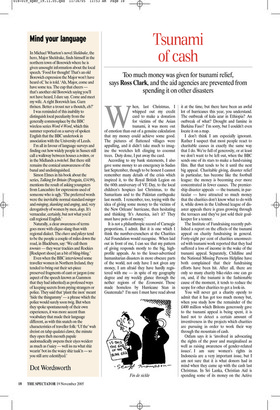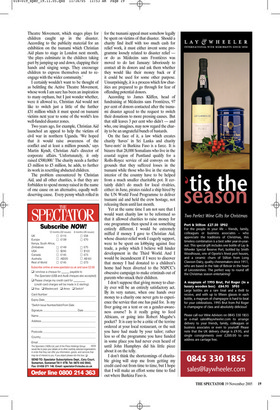Tsunami of cash
Too much money was given for tsunami relief, says Ross Clark, and the aid agencies are prevented from spending it on other disasters When, last Christmas, I whipped out my credit card to make a donation for victims of the Asian tsunami, it was more out of emotion than out of a genuine calculation that my money could achieve some good. The pictures of flattened villages were appalling, and it didnât take much to imagine the wretches left clinging to coconut trees. Duty done, I put away the card.
According to my bank statements, I also gave some money to an emergency in Sudan last September, though to be honest I cannot remember many details of the crisis which inspired it, to the Royal British Legion on the 60th anniversary of VE Day, to the local childrenâs hospices last Christmas, to the Samaritans and to the Pakistan earthquake last month. I remember, too, toying with the idea of giving some money to the victims of the New Orleansâ hurricane, then hesitating and thinking âItâs America, isnât it? They must have pots of money.â It is not a philanthropic record of Carnegie proportions, I admit. But it is one which I think the number-crunchers at the Charities Aid Foundation would recognise. When laid out in front of me, I can see that my pattern of giving responds mostly to the big, highprofile appeals. As to the lesser-advertised humanitarian disasters in more obscure parts of the world, not only have I not given any money, I am afraid they have hardly registered with me â in spite of my geography degree and my weekly glance through the nether regions of the Economist. Those made homeless by Hurricane Stan in Guatemala? Iâm sure I must have read about it at the time, but there have been an awful lot of hurricanes this year, you understand. The outbreak of kala azar in Ethiopia? An outbreak of what? Drought and famine in Burkina Faso? Iâm sorry, but I couldnât even locate it on a map.
I donât think I am especially ignorant. Rather I suspect that most people react to charitable causes in exactly the same way that I do. Weâre full of generosity, or at least we donât want to be left out, when the BBC sends one of its stars to make a fund-raising film. But that tends to be it until the next big appeal. Charitable giving, disaster relief in particular, has become like the football league: the money is becoming ever more concentrated in fewer causes. The premiership disaster appeals â the tsunami, in particular â have attracted so much money that the charities donât know what to do with it, while down in the Unibond league of disaster appeals there is grass growing through the terraces and theyâve just sold their goalkeeper for a tenner.
The Institute of Fundraising recently published a report on the effects of the tsunami appeal on charity fundraising in general. Forty-eight per cent of charities unconnected with tsunami work reported that they had suffered a loss of income in the wake of the tsunami appeal. Separately, Childline and the National Missing Persons Helpline have both complained that their fundraising efforts have been hit. After all, there are only so many charity bike-rides one can go on, and, if the tsunami is the fashionable cause of the moment, it tends to reduce the scope for other charities to get a look-in.
You will never get a charity openly to admit that it has got too much money but, when you study how the remainder of the ÂŁ400 million which Britons generously gave to the tsunami appeal is being spent, it is hard not to detect a certain amount of inventiveness in the projects which charities are pursuing in order to work their way through the mountain of cash.
Oxfam says it is âinvolved in advocating the rights of the poor and marginalised as well as raising awareness of gender-related issuesâ. I am sure womenâs rights in Indonesia are a very important issue, but I am not sure that it is what donors had in mind when they came up with the cash last Christmas. In Sri Lanka, Christian Aid is spending some of its money on the Active Theatre Movement, which stages plays for children caught up in the disaster. According to the publicity material for an exhibition on the tsunami which Christian Aid plans to stage in London next month, âthe plays culminate in the children taking part by jumping up and down, clapping their hands and singing songs. They encourage children to express themselves and to reengage with the wider community.â I certainly wouldnât want to be thought of as belittling the Active Theatre Movement, whose work I am sure has been an inspiration to many orphans, but I just wonder whether, were it allowed to, Christian Aid would not like to switch just a little of the further ÂŁ31 million which it must spend on tsunami victims next year to some of the worldâs less well-funded disaster zones.
Two years ago, for example, Christian Aid launched an appeal to help the victims of civil war in northern Uganda. âWe hoped that it would raise awareness of the conflict and at least a million pounds,â says Martin Kyndt, Christian Aidâs director of corporate affairs. âUnfortunately, it only raised ÂŁ500,000.â The charity needs a further ÂŁ3 million to ÂŁ5 million, he adds, to further its work in resettling abducted children.
The problem encountered by Christian Aid, and all other charities, is that they are forbidden to spend money raised in the name of one cause on an alternative, equally welldeserving cause. Every penny which rolled in for the tsunami appeal must somehow legally be spent on victims of that disaster. Should a charity find itself with too much cash for relief work, it must either invent some programme loosely related to disaster relief or do as MĂ©decins sans FrontiĂšres was moved to do last January: laboriously to contact all its donors and ask them whether they would like their money back or if it could be used for some other purpose. Unsurprisingly, it is a process which few charities are prepared to go through for fear of offending potential donors.
According to James Kliffen, head of fundraising at MĂ©decins sans FrontiĂšres, 97 per cent of donors contacted after the tsunami disaster agreed to the request to switch their donations to more pressing causes. But that still leaves 3 per cent who didnât â and who, one imagines, may now regard the charity to be an ungrateful bunch of bastards.
On the face of it, a law which creates charity âhavesâ in Sri Lanka and charity âhave-notsâ in Burkina Faso is a farce. It is bizarre that 28,000 Somalians who live in the coastal region of Puntland qualify for a Rolls-Royce service of aid convoys on the grounds that they suffered losses in the tsunami while those who live in the starving interior of the country have to be helped from a much smaller charitable pot. It certainly didnât do much for local rivalries, either: in June, pirates raided a ship hired by the UN World Food Programme to deliver tsunami aid and held the crew hostage, not releasing them until last month.
Yet at the same time I am not sure that I would want charity law to be reformed so that it allowed charities to raise money for one programme then spend it on something entirely different. I would be extremely miffed if money I gave to Christian Aid, whose disaster-relief work I eagerly support, were to be spent on lobbying against free trade, a policy which I believe will hinder development in the Third World. And I would be incandescent if I were to discover that money I had donated to a childrenâs home had been diverted to the NSPCCâs obsessive campaign to make criminals out of parents who smack their children.
I donât suppose that giving money to charity ever will be an entirely satisfactory act. By its very nature, when one hands over money to a charity one never gets to experience the service that one has paid for. Is my fiver going on a tent or on a gender-awareness course? Is it really going to feed Africans, or going into Robert Mugabeâs pocket? It is easy to be a critic of the terrine ordered at your local restaurant, or the suit you have had made by your tailor; rather less so of the programme you have funded in some place you had never even heard of until John Humphrys did his little piece about it on the telly.
I donât think the shortcomings of charitable giving will stop me from getting my credit card out from time to time, but I hope that I will make an effort some time to find out where Burkina Faso is.


























































 Previous page
Previous page